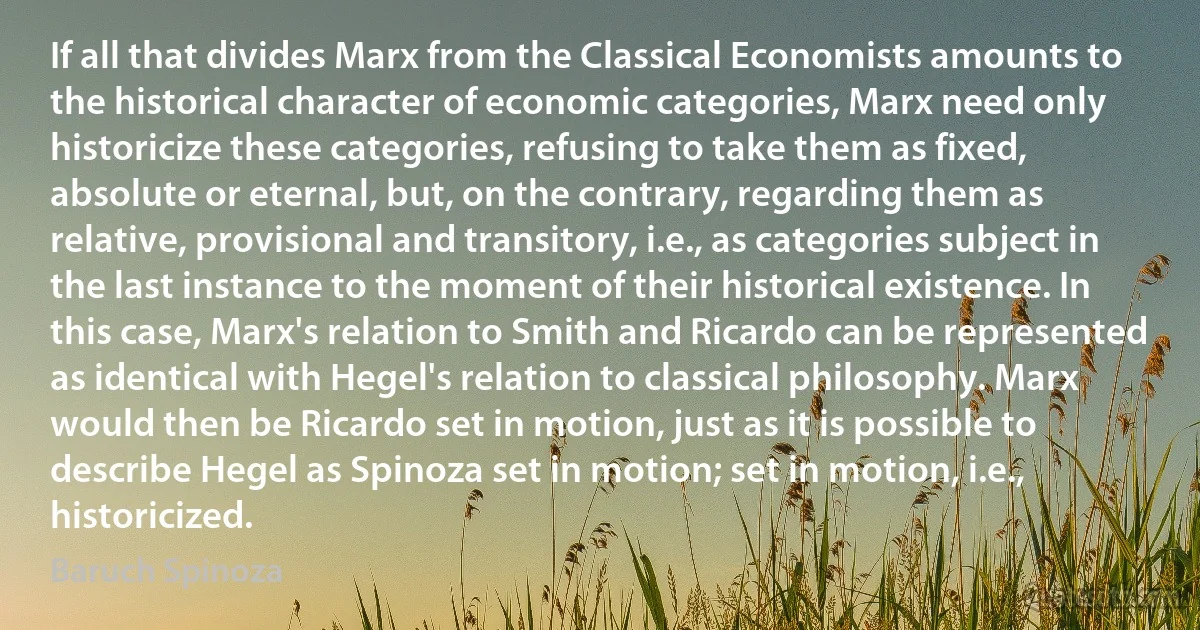
If all that divides Marx from the Classical Economists amounts to the historical character of economic categories, Marx need only historicize these categories, refusing to take them as fixed, absolute or eternal, but, on the contrary, regarding them as relative, provisional and transitory, i.e., as categories subject in the last instance to the moment of their historical existence. In this case, Marx's relation to Smith and Ricardo can be represented as identical with Hegel's relation to classical philosophy. Marx would then be Ricardo set in motion, just as it is possible to describe Hegel as Spinoza set in motion; set in motion, i.e., historicized.
Baruch SpinozaRelated topics
case character classical historical instance last moment need possible set take marx hegel ricardoRelated quotes
There is no country in Europe which does not have in some corner or other one or several ruined fragments of peoples (Völkerruinen), the remnant of a former population that was suppressed and held in bondage by the nation which later became the main vehicle of historical development. These relics of a nation mercilessly trampled under foot in the course of history, as Hegel says, these residual fragments of peoples (Völkerabfälle) always become fanatical standard-bearers of counter-revolution and remain so until their complete extirpation or loss of their national character, just as their whole existence in general is itself a protest against a great historical revolution.

Friedrich Engels
I had hoped that out of so many stories you would at least have produced one or two, which could hardly be questioned, and which would clearly show that ghosts or spectres exist. The case you relate... seems to me laughable. In like manner it would be tedious here to examine all the stories of people, who have written on these trifles. To be brief, I cite the instance of Julius Caesar, who, as Suetonius testifies, laughed at such things and yet was happy. ...And so should all who reflect on the human imagination, and the effects of the emotions, laugh at such notions; whatever Lavater and others, who have gone dreaming with him in the matter, may produce to the contrary.

Baruch Spinoza
The moment that the topic of the pre-European African past is raised, many individuals are concerned for various reasons to know about the existence of African "civilizations.” Mainly, this stems from a desire to make comparisons with European "civilizations.” This is not the context in which to evaluate the so-called civilizations of Europe. It is enough to note the behavior of European capitalists from the epoch of slavery through colonialism, fascism, and genocidal wars in Asia and Africa. Such barbarism causes suspicion to attach to the use of the word "civilization” to describe Western Europe and North America.

Walter Rodney
According to one mode... nature is thus denominated, viz. the first subject matter to every thing which contains in itself the principle of motion and mutation. But after another mode it is denominated form, which subsists according to definition: for as art is called that which subsists according to art, and that which is artificial; so likewise nature is both called that which is according to nature, and that which is natural. ...that which is composed from these is not nature, but consists from nature; as, for instance, man. And this is nature in a greater degree than matter: for every thing is then said to be, when it is form in energy... entelecheia, rather than when it is incapacity.

Aristotle
Economic history has contributed significantly to the formulation of economic theory. Among the economists who have found history an important source for their ideas are Smith, Malthus, Marx, Marshall, Keynes, Hicks, Arrow, Friedman, Solow, and Becker. Failure to take account of history, as Simon Kuznets (1941) stressed, has often led to a misunderstanding of current economic problems by investigators who have not realized that their generalizations rested upon transient circumstances. Nowhere is the need to recognize the role of long-run dynamics more relevant than in such pressing current issues as medical care, pension policies, and development policies.

Robert Fogel
